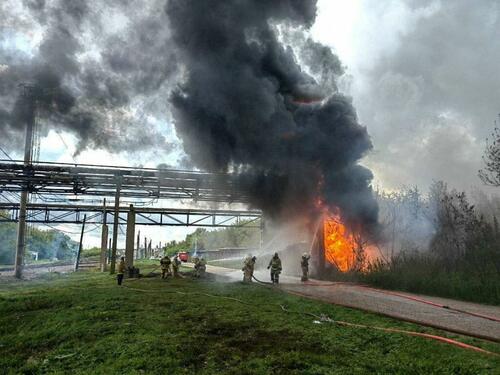In a huge and surprise development, Ukrainian President Volodymyr Zelensky has specified and verbalized what could be a first concrete step toward ceasefire between Russia and Ukraine.
He told journalists in Kiev this week that both sides should mutually agree on halting all aerial attacks on energy targets and cargo ships, and that this could pave the way for negotiations to end the war.
The comments were first reported by Financial Times on Tuesday, which quoted the Monday remarks as follows: "when it comes to energy and freedom of navigation, getting a result on these points would be a signal that Russia may be ready to end the war."

"We saw during the first (peace) summit that there could be a decision on energy security," he explained to reporters. "In other words—we do not attack their energy infrastructures; they don't attack ours. Could this lead to the end of the war's hot phase? I think so."
This marks a first such known overture of this nature, and comes at a crucial moment that the Ukrainian population is bracing for a harsh winter, given especially the rolling blackouts, frequent emergency power outages, and severely damaged power grid.
The last year of war has seen Russian aerial attacks primarily focus on degrading Ukraine's power infrastructure, including knocking offline key thermal power plants, which has resulted in some 60% of Ukraine's power generation being disabled.
This has left the war-ravaged country primarily reliant on nuclear power and imports from European partners.
On the other side of the battle lines, the last several months have seen Russian oil and energy facilities, as well as some military bases and ammo storage depots, get hammered by cross-border drone attacks from Ukraine.
Russia's defense ministry has been reporting almost nightly drone intercepts over Russian territory. Large fires at oil depots in Russia's southern oblasts have now become a monthly reality.
It seems Ukraine may have been engaged in such risky escalations of these cross-border strikes precisely to build leverage at a future negotiating table. But it remains that Russia's vast energy infrastructure has barely been dented, and the situation inside Russia is far from desperate, especially compared to Ukraine's crisis.
As FT wrote, "If Moscow and Kyiv agreed to end strikes on their respective energy infrastructures, it would be a significant step towards de-escalating the conflict, Zelenskyy said in reference to Ukrainian drone attacks on Russian oil refineries."
And yet recent escalations appear to have made it less likely that direct negotiations would happen, at least according to public statements from officials on both sides. But on the ground in the east, in the Donbass, Russian forces are clearly on the advance, and Ukraine's severe manpower problems have become more and more obvious and public.
Zelensky's potential 'offer' of mutually halting aerial attacks on energy sites comes as he's been promoting his five-point 'victory plan' - which so far has received a muted response in Washington and among NATO leaders. The quiet signals from the Western allies appear to be pushing Kiev toward winding down the conflict, at the negotiating table, as opposed to escalation which could lead to direct Russia-NATO fighting.
This is a significant turn, given that up until this week Zelensky had always rejected the very idea of talks with Putin, saying he would not negotiate with Moscow so long as the Russian strongman remains in power. That thinking appears to have changed, likely a reflection of the increasing desperation Ukraine's armed forces are feeling.